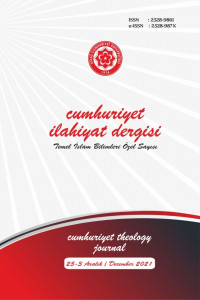Ev/ اَوْ Bağlacının İfadeye Kattığı Farklı Anlamların Türkçe Meâllere Aktarımı Sorunu
The Problem of Transferring the Different Meanings of Conjunction ev/ اَوْ to Turkish Meāls
Author(s): Ahmet KaradağSubject(s): Islam studies, Semantics, Translation Studies, Phraseology, Qur’anic studies
Published by: Cumhuriyet Üniversitesi İlahyat Fakültesi
Keywords: Tafsīr; Meāl; Conjunction; Difference; Transfer;
Summary/Abstract: The words used in the languages generally have an original/basic meaning. However, these words gain new and special meanings over time apart from their basic meaning. These emerging meanings are not completely independent of the basic meaning. Because new and special meanings emerge on the axis of basic meaning. In the Qurʾān, naturally, many words are used in connotations other than their original meaning. Therefore, it is not possible to give a correct meaning to the verse without determining the meaning of the words in the verses. In this study, it was investigated whether the conjunction ev in the verses was translated into Turkish correctly. For this purpose, firstly, the most accurate meanings of the conjunction ev in the verses discussed were tried to be determined from the vucūh and nezāir and tafsīr books, then these meanings were compared according to meāls and translation errors were pointed out. Accurate translations are emphasized; alternative translations are also presented when necessary. The conjunction ev in its basic meaning in Arabic indicates that the speaker is in doubt and hesitation in sentences expressing proposition and judgment In sentences such as orders and demands, it indicates that the addressee can choose between the options. However, this conjunction is sometimes used instead of conjunctions/prepositions such as and, even, to, until and except. In the vucūh and nezāir books, which are accepted as the Qurʾānic dictionary, it is agreed that the conjunction ev is used instead of and and even in the Qurʾān. In many tafsīrs much more meanings are given to the conjunction ev and it is stated that this conjunction is used instead of conjunctions such as until, to, except. In addition, it is stated in the some tafsīrs that conjunction ev adds various meanings to the expression such as elaboration, diversity, division and concealment. Where the conjunction ev is used in its basic meaning, translation errors were not made in the majority of the translations, except in very rare cases. Translation errors related to the conjunction ev mostly occurred when this conjunction was used out of its own meaning. Most of these errors are related to the words attributed to Almighty Allah by stating propositions and judgments. Because the conjunction ev used in these sentences indicates that the speaker is in doubt. However, this cannot be the case for Almighty Allah. Because Almighty Allah never doubts the matters He informs. Therefore, it is clear and certain that the conjunction ev is not used in the basic sense in such verses. It is determined that in the meāls we examined, this detail was generally not paid attention to. Although it is certain that the conjunction ev in these expressions attributed to Allah is not in the basic sense, it cannot always be clearly understood from the context in what sense it is used. Therefore, different opinions have been asserted in the sources on this issue. As a result, a scholar has taken the conjunction ev in any verse that comes in such a form to mean and, one to even, and another to except. The author of meāl usually prefers one of these meanings and tries to transfer it to the target language. However, it may not be possible to transfer every preferred meaning to meāl. For example, while it is possible to translate the meaning of and and even of the conjunction ev into Turkish, it doesn’t seem possible to transfer the meaning of ibhām/hide from the interlocutor. Therefore, a meāl writer who prefers the meaning of ibhām should translate this verse adhering to the words, and explain the meaning in the additional explanation section. Because in such a case, it is not possible to transfer the meaning to Turkish only through translation. Another reason why some verses in which the conjunction ev is used are translated incorrectly into Turkish is the attempt to convey the forms of expression particular to Arabic through literal translation. In such cases, the correct meaning should be determined first, and then the translation should be made without depending on the words. Because the purpose of translation is to convey the meaning, not the words. This study has confirmed that the author of the translation should have knowledge of the subtleties of the source and target language, and that he should make maximum use of the works written on vucūh and nezāir and the sources of tafsīr. However, it is also emphasized that every information contained in these works should not be accepted as essential without being subject to criticism.
Journal: Cumhuriyet İlahiyat Dergisi
- Issue Year: 25/2021
- Issue No: 3
- Page Range: 983-1000
- Page Count: 18
- Language: Turkish

